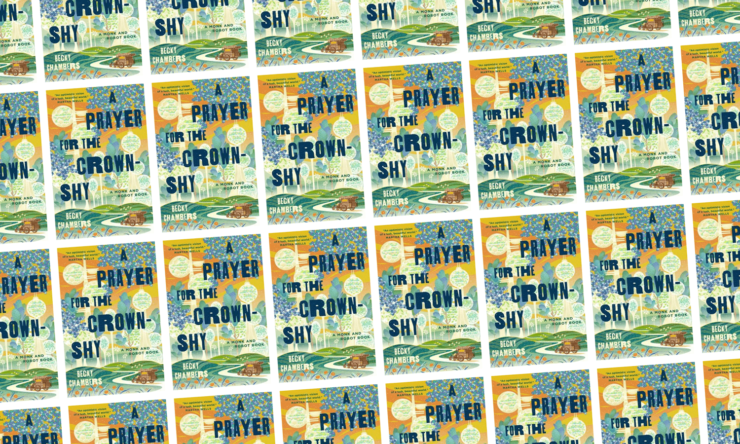I am somewhere between an outdoorsy person and not, which is to say I feel profound joy and catharsis at the natural sublime while also being extremely prone to bug bites, sunburn, and anxiety. As someone who lives most of my life in a city, separate from the world in its more untouched state, I find myself simultaneously drawn to nature, and also often incapable of feeling truly present within it unless I really try. Especially in the midst of this fucking pandemic, which has scrambled my brain and heart with fresh heaps of that aforementioned anxiety. It’s hard to take it in. To set down the phone camera, the maps app, the terror and rage that everything beautiful I’m looking at is steadily being eroded by the hubris of a dozen-odd extremely powerful supervillains. But I have to, I have to, otherwise what’s the point of any of this?
I’m a bit more conscious about focusing on this stuff now. Because photos aren’t going to capture what it feels like, and focusing on future despair won’t prevent it, it’ll only prevent me from experiencing present peace. I’m not saying I’m great at it, it’s still a practice, but I am practicing. I started the last time I was in my mother’s homeland of the Philippines at the end of 2019, grieving my father. I was bug-bitten and sunburnt and staring at a magnificent little waterfall nestled within the trees, and I had the obvious yet quietly massive realization that it doesn’t stop when no one’s watching. It’s this gorgeous, heart-shifting marvel, and we can all crowd around and look at it but it doesn’t do it for us. It doesn’t stop at night, and it doesn’t care we’re there, and it doesn’t care that I’m grieving. How wonderful, how humbling, to share this world with life and power like this.
I share this perspective with lots of people, including Sibling Dex. In A Prayer for the Crown-Shy, the second installment of Becky Chambers’ Monk & Robot series, tea monk Dex and the robot Splendid Speckled Mosscap continue their journey and wrestle with the implications of Mosscap’s question: what do people need? Dex, much to my envy, gets to navigate this question in something close to a post-apocalyptic paradise. As established in the first volume, humans made a mess of everything in the way we’re currently doing, and it was much to our advantage that the robots fucked off and left us to our own devices at the end of the Factory Age. Generations later, Panga is a peaceful place, where everyone’s needs seem to be at least functionally, fundamentally met. Dex finds their work as a tea monk rewarding, they’re good at it and it helps people. Yet Dex still feels that late-20s sense of restlessness. They’re seeking purpose, which works out well when they meet the first robot to cross paths with a human in an age, and the two of them set off on a gentle quest for Mosscap to find out what humanity needs. That’s one of the core strengths of this series, using a genre premise of epic scope to tell an intimate, compassionate story that speaks to the very root of what it means to be alive.
Buy the Book


A Prayer for the Crown-Shy
A Psalm for the Wild-Built did the work of establishing the world, premise, and characters, so now we get to play in it. Mosscap and Dex make new friends, navigate their fresh near-fame, and make their way through the world to Dex’s childhood home, and beyond. Returning home, as it does, makes both Dex and Mosscap question their purpose again. They get to question it together now, though, and that helps.
Because that’s the thing, isn’t it? Even in that place of relative peace, I don’t think we’d be settled. Not always, at least, not all the way. There’s still going to be a pull sometimes, the itch that what we’ve chosen is an insufficient use of our strange, epic, intimate time on this earth. That we are not doing enough. That we are not enough. Dex knows you don’t need a reason to be tired. You don’t need to earn rest or comfort, you can just be. They’ve built their work and their faith around this truth. Yet how can they tell others they’re enough as they are when they still have trouble believing it themself? And when Dex’s father turns Mosscap’s question back on itself, Mosscap has to look at itself, the world, and its place in it that much differently.
Prayer is a bit cheekier than Psalm, but no less of a meditative warm hug. For me it’s even more so, because as the relationship between Mosscap and Dex deepens, we’re enveloped in the tangible, growing fondness between them. There’s teasing at times, slyness that emerges with familiarity, and I feel steadier in their stories as they wrestle with these immense concepts. Like crown-shyness, or the way the leaves of certain trees are said to stop growing before tangling with those of others, creating lines of simultaneous connection and separation between. In our world there’s some debate as to whether it’s real or not and what causes it, but it’s a lovely concept, one that feels very suited to Panga. Coexist, do less harm. We are parts of a whole.
And what does it mean to be whole? Must a need be unmet to answer Mosscap’s question? What does it actually mean to have enough, to be enough? The waterfall will not bring my father back to life. but nothing will, and I am alive for a while longer yet, and if I try not to get mired in the tragedy that my father cannot watch this waterfall with me, that I’ll never get to tell him how it makes me feel, then I get to watch the waterfall and actually appreciate it. Now, he would’ve wanted me to watch the waterfall. To recognize how beautiful it is, how small I am in the wake of it, how small it is in the scheme of the earth. How small we both are, and yet I chose to spend several precious moments of my life in the enormity of its impassive company. It changed me and it didn’t, and I think that is both besides the point and the point itself.
A Prayer for the Crown-Shy is exactly the solace of a book I need right now and I know I’m not alone. It feels perfectly true to Psalm and a natural extension. I’m grateful to find certain solace in this series and I look forward to more.
Don’t expect big plot or twists. The writing itself manifests its core morality, and in that way proves its own core idea (because it seems too prescriptive to call it a thesis)—it is enough to ask these questions, sometimes. You don’t have to earn catharsis. It can be enough to share with the ones you care about the meditations of the wonders of the world, dwelling on what it means to be alive. These gently profound observations, these personal aches and these intimate joys…if that’s not why we’re here, it’s certainly what matters, on most of our day to days.
This novella is gentle, hopeful, and fundamentally queer in how it conceives of care and family. Accessible and propulsive, it’s a sort of modern parable for anyone who feels somewhat adrift, even when they’re not sure they should.
I’m still grieving. And there are still waterfalls, even and in fact especially, when no one is watching. And there are still books just like this. That meet you where you are, and remind you in the clearest, warmest way, that you are not alone.
A Prayer for the Crown-Shy is available from Tordotcom Publishing.
Read an excerpt here.
Maya Gittelman is a queer Fil-Am and Jewish writer and poet. They have a short story forthcoming in the YA anthology Night of the Living Queers (Wednesday Books, 2023). She works in independent publishing, and is currently at work on a novel. Find them on Twitter (@mayagittelman) or Instagram (@bookshelfbymaya).










